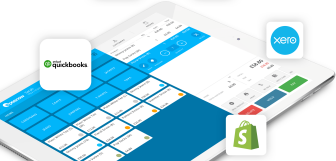Integrate accounts with your POS system
Clarity, simplicity, and ease of use are phrases not commonly associated with small business accounting, but there’s no reason they shouldn’t be. Thanks to advances in point of sale (POS) technology, business owners can now integrate powerful accounting software into their technology.
No one starts a business with dreams of late nights going over receipts and counting pennies. Epos Now has a range of partnerships with some of the biggest bookkeeping integrations in the world. Thanks to these partnerships, our customers can take full control of their accounting.
In this blog, we’ll go into detail about some of our popular accountancy apps and explain why you should integrate your accounts.
Why should I integrate my accounts?
Integrating your accounts package with your POS system offers a whole host of business benefits;
Save time
The manual input of accounts data is tedious and time-consuming, attributing to hours of admin time each week. Integrating your accounts removes this step, with your end of day figures automatically pulled through to your bookkeeping software. This ensures you can focus on other business-critical tasks, or spend more time doing what you love.
Save money
Sending your accountant reams of paperwork and spreadsheets to tackle each year-end is costing you by the hour. An automated accounts module ensures your data is in a neat bundle, with all the information they need at their fingertips reducing the amount of time it takes for them while reducing the cost to your business.
Eliminate human errors
Not only is manual data input time-consuming, but it’s also prone to human error. By removing this step you avoid unnecessary and costly errors that could damage your business.
What package is right for me?
Epos Now has partnered with two industry leaders to give you more flexibility and choice when it comes to selecting an accounts module that's right for your business.
Xero
Xero is an easy to use online accounting software package that is designed specifically for small businesses. Xero has all you need to run your business - including invoicing, payroll, paying bills, sales tax returns, and reporting. Your bank statements are automatically imported and categorized, letting you see your cashflow in real-time.
Like Epos Now, Xero is built on the cloud which means you can log in from anywhere, anytime, with your PC, Mac, or mobile. You can even invite your team and work together on financials and collaborate over your up-to-date numbers.
Learn more about Xero.
Sage
Sage One is the leading online accounting software that’s ideal for start-ups and small businesses, with over 3 million customers worldwide. Logical and easy to use, Sage One allows you to manage your finances, create quotes and invoices, prepare tax returns, and connect to your bank with automatic bank feeds.
Sage One is also a cloud-based system meaning all you need is an internet connection to access your data. Epos Now Sales, Products, Stock, Customers & Suppliers are automatically synchronized to Sage One in real-time. Sage ensures your business remains compliant with payroll legislation, especially important for businesses with seasonal workers and high staff turnover.
Learn more about Sage.
QuickBooks
QuickBooks is a name known around the world for online accountancy services. It claims to have millions of customers worldwide and has various packages and programmes available for both large and small businesses. The Epos Now QuickBooks integration allows invoicing, receipt management, business reports, and more.
QuickBooks, like the other integrations mentioned above, is cloud-based. This means that you can access your finances from anywhere in the world as long as you have an internet -connected device. Thanks to our seamless integration, Epos Now and QuickBooks automatically sync together.
Learn more about QuickBooks.
TIP: Liked this blog? Check out our additional financial resources including our ‘What does ACH stand for’ guide and our ‘Credit card authorization’ guide.



